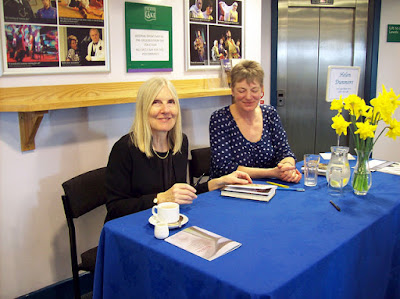"Poetry searches for radiance, poetry is the kingly road that leads us farthest" (Adam Zagajewski)
Wednesday, 28 February 2018
Helen Dunmore: 'Convolvulus'
Helen Dunmore (left), 2014. Photo by summonedbyfells. Used under Creative Common license
Helen Dunmore, the British poet and novelist who died last year at the age of 64, recently won not only the 2017 Costa Poetry award for her final poetry collection Inside the Wave, but also the overall Costa Book of the Year award.
So far I've read relatively few poems from Inside the Wave or her other works, which probably makes this post a little premature. From what I have read, though, her poems seem to me balanced, spare but vivid, a personal voice aware of the wider world. I was somewhat reminded of the poetry of Sarah Maguire, who also died last year at around the same age. I'm also looking forward to reading Dunmore's novel Exposure and perhaps others.
Dunmore's poem 'Convolvulus', published in 2004, is one that I read recently and have often thought of since. In the symbology of flowers, the convolvulus can represent extinguished hopes and death. It is also a plant which can act as a weed and choke out others. The poem thus becomes a thought-provoking and disturbing meditation on hope (a flower that continues to bloom), but also the permanence of death and the repeated dashing of hopes throughout human history. The flower is resilient: this is both a source of optimism and despair. "Crushed, they breathe out their honey, and slowly/come back to themselves in the balm of the night". Humans cannot regain life or hope so easily, certainly not in the face of violence.
It is very telling that the speaker first says "where we say bombs, there will be nothing/until we turn to reconstruction" (the war will stop, the ceasefire will hold) but later acknowledges "Where we say bombs, there will be bombs". The poem ends with the recurring threat of violence in "the shadow of planes" over the sea, which reminded me irresistibly of how I felt when I saw the first plane after 9/11, days later, over a beach near my home on Vancouver Island.
'Convolvulus' reminded me of 'Desert Flowers' by Keith Douglas, a favourite poem: these two poems share the themes of war and the ambiguity of the flower imagery. I also thought that both Douglas and Dunmore seem curiously outside of time. Douglas has dated relatively little considering that he was writing in the 1930s and '40s, and Dunmore seems unlikely to become dated in any kind of hurry.
Neil Astley of Bloodaxe has just written a touching tribute to Helen Dunmore which you can read here: https://www.waterstones.com/blog/helen-dunmore-a-personal-tribute-by-bloodaxe-books-editor-neil-astley
Sunday, 4 February 2018
Philip Levine: 'The Second Going'
On the list of poems which have haunted me and refuse to leave, this is a recent addition: 'The Second Going' by Philip Levine.
Philip Levine, who was the US Poet Laureate in 2011-2012, died in 2015 at the age of 87. This poem appeared in 2017 in The Golden Shovel, an anthology in honour of Gwendolyn Brooks (who was also a US Poet Laureate, and the first African-American woman to receive that honour.) The "golden shovel" poetic form was devised by Terrance Hayes and it uses each word of a line of poetry, in order, to form the last word of each line in the new poem. The line which inspired 'The Second Going', "The only sanity is a cup of tea", appears in Gwendolyn Brooks' poem 'Boy Breaking Glass'.
'The Second Going' is a beautiful example of one of my own favourite poetic "forms" (if it can be called that): the very short poem. In just eight lines, this poem says so much.
My own reading of it is rather dark. I see this as an end-of-life poem, which it may literally have been for Philip Levine, as he died in 2015 and the poem must have been commissioned for the 2017 anthology. Even the poem's shape, appearing as a descending staircase, suggests an ending. The poem's opening, "Again the/day begins", has a weariness about it, and "mercy" (in the final line) is a word I identify with assisted death or, at least, death after an exhausting illness. A sad poem, then, but also an illuminating one, like the strange clarity that can come after being awake for "long nights & absent dawns".
Photo: 'night' by Steve Johnson. Used under Creative Commons license
Subscribe to:
Comments (Atom)

